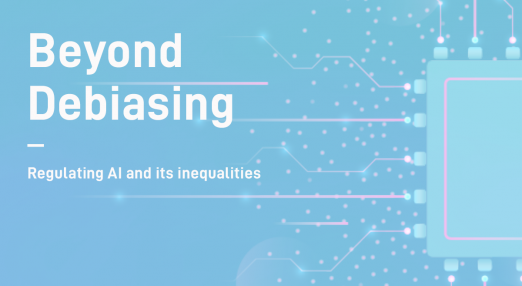EDRi-gram, 3 November 2021
In this edition of the EDRi-gram, we share EDRi's guide to help Members of the European Parliament make strong human rights choices regarding the Digital Services Act amendments prior to the IMCO vote. We also share the unfortunate news of how Europol's unfettered and problematic data-driven model of policing has been given the green light, which will lead to serious risks of discrimination based on race, socio-economic status or class, and nationality.
Filter resources
-

EDRi-gram, 3 November 2021
In this edition of the EDRi-gram, we share EDRi's guide to help Members of the European Parliament make strong human rights choices regarding the Digital Services Act amendments prior to the IMCO vote. We also share the unfortunate news of how Europol's unfettered and problematic data-driven model of policing has been given the green light, which will lead to serious risks of discrimination based on race, socio-economic status or class, and nationality.
Read more
-

EDRi-gram, 20 October 2021
In this edition of the EDRi-gram, we share the launch of a collection of four scenarios that describe situations involving cross-border access to personal data and explains the necessary safeguards needed in the e-Evidence Proposal to mitigate these fundamental rights harms. We also demonstrate how software embedded in people’s devices can monitor our movements and surveil us, how a ban on surveillance advertising can fix Facebook and a lot more. Also now's your chance to submit your session proposal for the 10th annual Privacy Camp event, happening on January 25, 2022!
Read more
-

Closing the Loopholes in EU’s Net Neutrality Framework
The European net neutrality rules are being reformed to fix one of the biggest loopholes in the EU‘s framework: Zero-Rating. EDRi has been vocal about the dangers of Zero-Rating, a practice by which telecoms companies discriminate between online services by making some data traffic more expensive than other such traffic. Prompted by three judgments of the Court of Justice of the European Union, the Board of European Regulators for Electronic Communications (BEREC) has acknowledged that their previous 2016 Guidelines on how to enforce the Net Neutrality Regulation have to be overhauled. The direction of the reform is looking to confirm the previous submissions of EDRi over the past six years and today we add another submission to BEREC with the hope of fixing the last loophole in Europe’s net neutrality framework.
Read more
-

Top system and the right to repair
Some questions take thirty years to answer, even if just partially. In the early ’90s of the previous century, the EU legislative process was a battleground of American tech behemoths and some national champions from the EU. The legislative dossier was what was to become the 1991 Software Directive. And it was seen as an opportunity for European tech companies and others to break the hegemony of IBM through interoperability.
Read more
-

EDRi-gram, 6 October 2021
We celebrate a historic milestone for our human rights as the European Parliament heard what EDRi has been long advocating for and took a bold stand against unacceptably risky uses of AI like biometric mass surveillance and predictive policing. We also cheer for civil society's success in Serbia as community and international pressure forced the government to withdraw its law, threatening to subject people to oppressive and privacy intrusive biometric surveillance.
Read more
-

Building a coalition for Digital Dignity
In 2020 EDRi started to build the ‘Digital Dignity Coalition’, a group of organisations and activists active at the EU level dedicated to upholding rights in digital spaces and resisting harmful uses of technology. We’ve been organising to understand and resist how technological practices differentiate, target and experiment on communities at the margins - this article sets out what we’ve done so far.
Read more
-

Website blocking: No copyright liability for DNS services!
EDRi's member Society for Civil Rights (GFF) supports the independent DNS resolver Quad9 in a court case against an interim injunction ordering Quad9 to set up network blocks. The blocking of entire websites is a threat to freedom of information on the internet. Technologically neutral service providers must not bear the costs and risks of enforcing claims for copyright infringements for which they are neither involved in nor aware of.
Read more
-

EDRi-gram, 22 September 2021
In this EDRi-gram, we challenge the technical ‘debiasing’ as the main solution to AI-driven structural inequality and call on policymakers to tackle the root causes of the power imbalances caused by the pervasive use of AI systems. We also look at how Big Tech platforms are harming users and join forces with EDRi's member Panoptykon Foundation, along with 49 civil rights organisations, to urge the EU to empower users and ensure effective oversight of algorithms in their amendments to the Digital Services Act.
Read more
-

Digital Dignity Document Pool
Digital technologies can have a profound effect on our societies, but sufficient attention is rarely given to how certain applications differentiate between, target and experiment on communities at the margins. This document pool gathers resources for those that are interested in learning about and contesting the harms to dignity and equality that arise from uses of technology and data.
Read more
-

Booklet: If AI is the problem, is debiasing the solution?
The development and deployment of artificial intelligence (AI) in all areas of public life have raised many concerns about the harmful consequences on society, in particular the impact on marginalised communities. EDRi's latest report "Beyond Debiasing: Regulating AI and its Inequalities", authored by Agathe Balayn and Dr. Seda Gürses,* argues that policymakers must tackle the root causes of the power imbalances caused by the pervasive use of AI systems. In promoting technical ‘debiasing’ as the main solution to AI driven structural inequality, we risk vastly underestimating the scale of the social, economic and political problems AI systems can inflict.
Read more
-

EDRi-gram, 8 September 2021
In the first post-summer edition of the EDRi-gram, we are excited to announce EDRi's new staff members who have recently become part of the team. Join us in welcoming Fenya Fischler, who will be our Membership and Community Officer & Belén Luna, our new Campaigns Officer! We are also celebrating a big milestone in our signature collection to ban biometric mass surveillance as 60 000 people have signed the #ReclaimYourFace petition (hurray)
Read more
-

How a rotten Apple (and bad legislation) could spoil our private communications
In August 2021, Apple announced significant changes to their privacy settings for messaging and cloud services, only to “pause” it in early September. Earlier this summer, the European Parliament adopted in a final vote the derogation to the main piece of EU legislation protecting privacy, the ePrivacy Directive, to allow Big Tech to scan your emails, messages, and other online communications.In August 2021, Apple announced significant changes to their privacy settings for messaging and cloud services, only to “pause” it in early September. Earlier this summer, the European Parliament adopted in a final vote the derogation to the main piece of EU legislation protecting privacy, the ePrivacy Directive, to allow Big Tech to scan your emails, messages, and other online communications.
Read more
